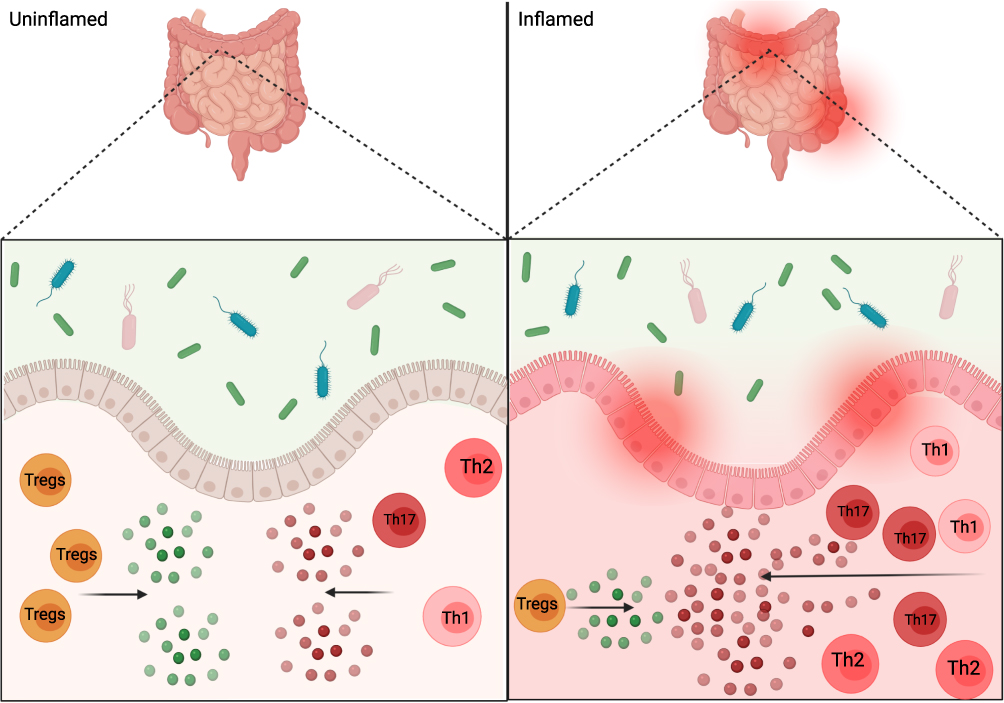A recent study published in the journal Immunity sheds light on the relationship between the gut microbiome and gastrointestinal health. The study, conducted on mice, reveals that when friendly and beneficial microbes take residence in the gut, the host produces a type of T cell known as commensal T cells. These specific T cells play a crucial role in maintaining the health of the gut by counteracting inflammation.
The findings of this study hold promise for the development of new treatments for inflammatory bowel diseases (IBD) such as Crohn’s disease and ulcerative colitis. By understanding how friendly microbes induce the production of anti-inflammatory commensal T cells, researchers may be able to develop therapies that can prevent intestinal inflammation associated with IBD.
The study, led by Ivaylo Ivanov, Ph.D., associate professor of microbiology & immunology at Columbia University Vagelos College of Physicians and Surgeons, builds upon Ivanov’s earlier research on the interaction between host cells and the gut microbiome. In previous work, his team discovered that the host produces specific T cells when friendly microbes take up residence in the gut. These T cells help regulate the microbial population and prevent overgrowth. Intrigued by these findings, Ivanov and his team aimed to investigate if commensal T cells had additional functions.
Using tissue culture and mouse models, the researchers found that commensal T cells possess the ability to reduce inflammation by producing a cytokine called IL-10. This is a key discovery, as commensal T cells exhibit unique features that balance inflammation and suppression. Typically, tissues contain two types of T cells: one that promotes inflammation to clear infection and another that suppresses inflammation to curtail the immune response once infection is resolved. However, commensal-induced T cells have characteristics of both types, suggesting that the immune response to friendly microbes has evolved to be less inflammatory.
Furthermore, the study revealed that commensal T cells can suppress other types of T cells, which indicates that they serve as a backup system to prevent autoimmunity. Autoimmunity occurs when excessive inflammation triggers the immune system to attack the body’s own cells. The presence of commensal T cells provides an additional layer of defense against this harmful immune response.
In addition to their implications for IBD treatments, these findings may also provide insights into the influence of the gut microbiome on other health conditions such as obesity, diabetes, and metabolic syndrome. Previous research by Ivanov’s team demonstrated that commensal T cells contribute to improved health in mice with obesity and diabetes. The anti-inflammatory activity of these T cells may play a role in these beneficial effects.
Moving forward, Ivanov’s lab plans to further investigate how commensal T cells influence health in various contexts. By unraveling the mechanisms behind the protective effects of commensal T cells, researchers may uncover new therapeutic strategies to combat gut inflammation and related conditions.
In conclusion, this study highlights the importance of a healthy microbiome in reducing gut inflammation. The presence of commensal T cells, induced by friendly microbes, helps maintain gut health by counteracting inflammation and suppressing autoimmunity. These findings pave the way for the development of novel therapies for inflammatory bowel diseases and offer insights into the broader impact of the gut microbiome on human health.
*Note:
1. Source: Coherent Market Insights, Public sources, Desk research
2. We have leveraged AI tools to mine information and compile it




